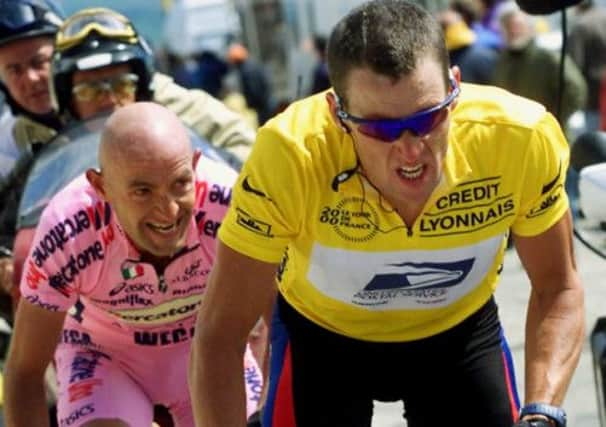Tour de France: Armstrong cheating hangs over Tour


The Briton, emulating compatriot Bradley Wiggins last year, smashed the field in awe-inspiring fashion – his victory reminiscent of dope-cheat Armstrong’s Tour dominance in the early 2000s.
While his rivals were left battling it out for second place long before the end of the three-week race, the Team Sky rider was facing questions over the sport’s tainted past. Froome’s curse is that he is the first rider to win the world’s greatest bike race since American Armstrong was stripped of his seven titles.
Advertisement
Hide AdAdvertisement
Hide Ad“It’s probably the worst Tour to try to win, the one where all the Armstrong thing comes out, the lids taken off and everybody realised what was going on,” said Team Sky principal Dave Brailsford.
“You come to the first Tour after that . . . You would expect the public who trusted in this sport for a long time to be a bit angry and a bit frustrated with what they found out. It’s understandable.”
Froome appreciates any Tour champion has to deal with the inevitable suspicion saying: “I think whoever was going to wear the yellow jersey would come under the same amount of scrutiny and I accept that. I’m also one of the guys who have been let down by the sport. We’re willing to do everything it takes to show people things are changing.”
Facing increasing scrutiny and doping allegations, Team Sky have been trying to ease the pressure. They released Froome’s data to sports daily L’Equipe – owned by Tour organisers ASO, who had them analysed by French biomechanics expert Frederic Grappe. The FDJ.fr team coach concluded that the Briton’s performances did not look suspicious.
An offer by Brailsford to have the World Anti-Doping Agency appoint an expert to look into all of his team’s data in order to prove they are riding clean was turned down. According to Jonathan Vaughters, the Garmin-Sharp manager who built his team on a strong anti-doping stance, it was bound to happen.
“It’s anticipated that this would happen. This is a symptom of the greater issue. The fundamental problem is there is no belief in the fact that the systems controlling the rider are trustworthy.”
Vaughters, a cheat as an Armstrong team-mate before coming clean, says the International Cycling Union (UCI) is not up to the task: “You have to address that problem or it will be the case for every other Tour de France winner,” he added.
Vaughters said the experts – or self-proclaimed experts – who have been analysing Froome and others’ performances, should be brought around a table to help reshape the fight against doping to make it more credible. Armstrong, after all, passed a couple of hundred tests.
Advertisement
Hide AdAdvertisement
Hide Ad“Has the leadership of the UCI ever asked the experts to come together and figure out a method, to come up with a solution? They could sit down and research a plan of action, come up with a new anti-doping strategy,” said Vaughters. “The irony is Brailsford did not send his data to the UCI, it is not trustworthy.”
The UCI launched the biological passport in 2008, but its failure to bring down Armstrong has been weighing on president Pat McQuaid. “That’s sad because if Brailsford were to send the data to the UCI everybody would laugh. That’s such an extreme loss of credibility,” said Vaughters.